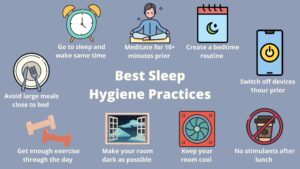Sleep Smarter: Unraveling the Secrets of Quality Sleep
Introduction
Sleep, the often underestimated elixir of life, is a cornerstone of our overall well-being. Beyond mere rest, quality sleep rejuvenates our body, sharpens our mind, and fortifies our emotional resilience. In this article, we embark on a journey to uncover the secrets of achieving and maintaining a restful slumber—because sleeping smarter means living better.
The Science of Sleep
Understanding the science of sleep is essential for unraveling its secrets. Delve into the intricate sleep cycles, from the restorative deep sleep to the dream-rich rapid eye movement (REM) sleep. Recognize the importance of circadian rhythms, the internal clocks that dictate when we feel awake and when we naturally wind down.

Creating a Sleep-Conducive Environment
Crafting an ideal sleep haven is vital for quality rest. Explore the elements of a sleep-conducive bedroom—cool temperatures, minimal light exposure, and a comfortable mattress and pillows. Embrace the tranquility of a clutter-free space that invites relaxation and serenity.

Prioritizing Sleep Hygiene
Sleep hygiene encompasses the practices and habits that pave the way to a restful night. Establish a consistent sleep schedule that syncs with your circadian rhythm. Unplug from electronic devices before bedtime, as the blue light they emit can disrupt your body’s natural sleep cues.

The Power of Rituals
Bedtime rituals signal to your body that it’s time to unwind and prepare for slumber. Engage in calming activities like reading, gentle stretches, or deep-breathing exercises. Sip on a soothing herbal tea that lulls your senses into a state of tranquility.

Nutrition and Sleep Harmony
What you eat and drink can significantly impact your sleep quality. Opt for sleep-supportive foods rich in tryptophan, magnesium, and melatonin, such as warm milk, bananas, and cherries. Consume heavier meals earlier in the evening to avoid indigestion disrupting your sleep.

Managing Stress for Peaceful Slumber
Stress can be the nemesis of restful sleep. Practice stress management techniques like meditation, mindfulness, or journaling to ease your mind before bedtime. Transform your bedroom into a stress-free zone that promotes relaxation and serenity.

Exercise for Sleep Enhancement
Regular physical activity contributes to better sleep, but timing is key. Engage in moderate exercise earlier in the day to revitalize your body without stimulating it close to bedtime. Discover the delicate balance between movement and rest.

Mind-Body Connection: Yoga and Sleep Harmony
Yoga, with its emphasis on breath control and gentle movements, is a powerful ally in the quest for quality sleep. Explore yoga sequences designed to induce calmness and relaxation, fostering an unbroken connection between mind and body.

Limiting Stimulants and Sleep Saboteurs
Caffeine and alcohol can wreak havoc on your sleep patterns. Limit your consumption of these substances, especially in the afternoon and evening hours. Embrace herbal teas and non-caffeinated options that promote tranquility.

Seeking Professional Guidance
If sleep troubles persist, seeking guidance from a healthcare professional is essential. Sleep disorders like insomnia or sleep apnea may require specialized treatment. Don’t hesitate to discuss your concerns and explore potential solutions with a qualified expert.

FAQs
Q: What are the benefits of getting enough sleep?
A: Getting enough sleep is essential for good health. It helps to:
- Improve cognitive function
- Boost your immune system
- Reduce stress levels
- Maintain a healthy weight
- Reduce the risk of chronic diseases
- Improve mood
- Increase energy levels
- Protect your heart health
Q: What are some common sleep problems?
A: Some common sleep problems include:
- Insomnia: Difficulty falling asleep or staying asleep
- Sleep apnea: A sleep disorder that causes breathing to stop and start during sleep
- Restless legs syndrome: A condition that causes an uncontrollable urge to move your legs
- Narcolepsy: A sleep disorder that causes excessive daytime sleepiness
- Nightmares: Vivid, disturbing dreams that can disrupt sleep
Q: What are some tips for getting a good night’s sleep?
A: Here are some tips for getting a good night’s sleep:
- Establish a regular sleep schedule and stick to it as much as possible, even on weekends.
- Create a relaxing bedtime routine.
- Make sure your bedroom is dark, quiet, and cool.
- Avoid caffeine and alcohol before bed.
- Get regular exercise, but not too close to bedtime.
- See a doctor if you have a sleep disorder.
Q: What are some common myths about sleep?
A: Some common myths about sleep include:
- You need 8 hours of sleep per night. While 8 hours is a good target for most adults, some people may need more or less sleep.
- You can’t catch up on sleep. While you can make up for some lost sleep, you can’t fully catch up on a chronic sleep deficit.
- Napping is bad for you. Napping can actually be beneficial for some people, as long as it’s not too long and doesn’t interfere with nighttime sleep.
- You can sleep train babies. Sleep training is a controversial topic, but there is some evidence that it can be effective.
Q: Where can I find more information about sleep?
A: There are many resources available to learn more about sleep. Here are a few suggestions:
- The website of the National Sleep Foundation (NSF) has a wealth of information on sleep.
- The website of the American Academy of Sleep Medicine (AASM) has a section on sleep disorders.
- The website of the Mayo Clinic has a section on sleep.
Conclusion: A Journey to Restful Nights
Unraveling the secrets of quality rest is a journey—a deliberate quest for rejuvenation, mental clarity, and emotional well-being. By embracing the science-backed principles of sleep hygiene, cultivating a tranquil sleep environment, and nurturing your mind and body, you embark on a path to sleep smarter and live better. Prioritize your sleep, for it’s not just a period of rest, but a gateway to a more vibrant and fulfilling life.

